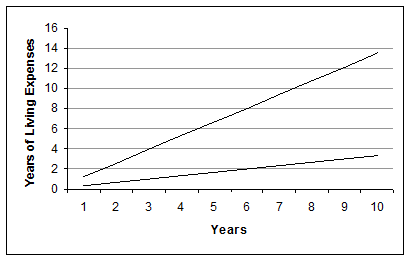 You work long, hard days, but you never have enough to be secure. Your husband or wife probably works too, and yet you still never get ahead. Now think about this: Your great-grandparents worked hard, and they did get ahead. You work just as hard, but you don’t make the same progress.
You work long, hard days, but you never have enough to be secure. Your husband or wife probably works too, and yet you still never get ahead. Now think about this: Your great-grandparents worked hard, and they did get ahead. You work just as hard, but you don’t make the same progress.
Was great-grandpa really that much better than you? Not likely. So, how was it that he could get ahead on one income, but you can’t?
Take a good look at this graph:

The top line shows how many years of living expenses your great-grandfather would have accumulated as a hard-working young man. The bottom line shows what you can save.
After working for five years, great-gramps had seven years of living expenses in the bank.
Doing the same things, you’d have less than two.
You’ve probably avoided this comparison because it makes you feel bad. If so, that was your big mistake, because it was never your fault.
When great-gramps worked hard, he kept the money. There was no income tax and no sales tax. (The government survived anyway.) There was no Social Security tax either, and the streets weren’t full of starving old people. Families were able to take care of their own.
In your great-grandparents’ day, it was very common for mechanics, carpenters, and shop-owners to make private business loans. Now you shuffle into banks with piles of the most personal documents and beg for loans. (As the banks create your loan money with a keystroke.)
You’ve Not Only Been Robbed, You’ve Been Demoralized
Why did this happen? Because Westerners accepted a lie: that they were bad people.
Think this through: Your money is taken from you before it can accumulate (“payroll deductions”), leaving you with barely enough to live a reasonable life. You have nothing left to help those who suffer unjustly – not because you don’t work, but because your surplus is skimmed away to Capital City.
Then, those same politicians have the audacity to call you a bad person for not wanting to help the poor. They make it almost impossible for you to give, then insult you for it.
Your great-grandparents were proud to help their friends and neighbors. They felt good about themselves and were proud to make the world a better place. Being robbed of this heritage is the worst crime of all.
So…?
This is the point where people ask, “What do we do about this?” And the answer is simple: Stop playing their game!
The system is rigged and the abusers make the rules. More or less everything big is in on the game. People have been trying to reform this thing for a long time, and have accomplished next to nothing.
The only sensible choice is to withdraw from the game and to start building something better .
**
The graph was generated as follows: $725 per year is the income in about 1903, based upon discussions with hard-working men who lived through the time. A figure of $325 per year for living expenses is taken from a New York Times article, dated September 29, 1907. Assets were presumed to appreciate at 10% per year. For 2008 {the year the graph was generated} the annual income was $45,000 and monthly expenses were $2,000. This young man pays 30% income taxes and investment return is calculated at a reduced rate of 8.5% because of taxes upon interest. The young man of 1905 is investing $400/year after living expenses of $325. His modern descendant is investing $7500/year after living expenses of $24,000.
**
Paul Rosenberg
www.freemansperspective.com
